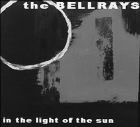BELLRAYS
In the Light of the Sun
(In Music We Trust)
Reissue of L.A. outfit’s scorching soul-punk debut.
Rescued from the mists of time—and the crummy, wow-and-flutter, hiss-prone world of cassette-only recordings—is hard-rock soul mavens the Bellrays’ 1993 debut, courtesy of Portland’s own In Music We Trust label. And while In the Light of the Sun does bear the telltale sleeve legend, “Support live music even it if sucks!” it betrays virtually none of its haphazard, lo-fi, one-take origins. By now, of course, Bellray Lisa Kekaula’s grits-and-gasoline vocals are the stuff of West Coast legend; she’s Aretha fronting the MC5 with the Memphis Horns guesting, or the Black Crowes’ Chris Robinson finally given that sex change he always wanted and dolled up in his finest Janis Joplin attire. The male ‘Rays are no mere pan-fried blooze explosion, either. Just check the sleek chicken-funk grooves of “Wandering Spirits” and “Same Ground” for proof, or the down ‘n’ dirty Blaxploitation-cum-psychedelic rutting of “Tell Me What the Sun Said.” Those, plus straight-up blasts of retro garage pop—”You’d Better Find a Way” is soulfully anthemic, while the radio-friendly title cut is just plain anthemic—paint this band and its charismatic frontwoman as born a few decades too late yet agile enough to take the message to the street. Apparently that message was received: In the decade since this album was originally released, the Bellrays have gotten nothing but rave press notices. Color this review—likewise, we’re sure. Fred Mills
THE TENNESSEE TWIN
Free to Do What?
(Mint CD)
Vancouver, B.C.’s Tennessee Twin whup the country into shape.
Country music rarely, if ever, raises a defiant fist in the dust-covered face of convention. Even alt-country tends to hug the rails of established tradition, eschewing modern politics for old-fashioned songs about drinking and heartache. Of course, all that will change if Tennessee Twin’s Cindy Wolfe has her way. On the band’s debut record, Free to Do What?, Wolfe (twin sister of Bratmobile’s Allison Wolfe) is raising the consciousness of trad country and putting it to work for feminist and anti-capitalist causes. Here, the personal is the political; Wolfe’s status as a squeaky-voiced white girl is both a vehement political position and a reason to scrutinize her own beliefs. On the peppy title track, she delves into her own privilege, singing, “Free to do what?/To ruin the whole world/What I’ve been taught as a North American girl.” On “The Apple of Your Black Eye,” she turns typical depictions of spousal abuse upside down by granting power to the victim rather than lingering on her trauma. Even the record’s cover, with its image of Wolfe in a silken party dress, hands clasped round a huge protest sign, signals a shift toward empowerment. This is music that kicks and fights its way toward equality, rather than whimpering for it. Tizzy Asher
Tennessee Twin play Graceland at 3 p.m. Sun., June 16. $8 adv.
SILKWORM
Italian Platinum
(Touch and Go)
First release as a Chicago band, second as classic rockers, umpteenth as Albini disciples.
If last year’s Lifestyle was Silkworm’s attempt to sink their teeth into a classic, yet sardonically intoned, post-punk/ indie-rock sandwich, then Italian Platinum is the gold-cap-tooth smile bidding the band’s former, more artsy leanings—and the city of Seattle—a final goodbye. Onetime local stragglers Tim Midgett and Michael Dahlquist joined guitarist Andy Cohen in Chicago, where the reunited trio increased their number by two— sort of. Sweet-voiced Kelly Hogan backgrounds a couple of tracks and lends lead to what could be the year’s most beloved indie ballad (“Young”), while Bedhead/ New Year songwriter/guitarist Matt “Bubba” Kadane spots several songs with melancholy organ notes and pretty piano lines. And what of the geographical changes? One might predict the new zip code would result in a more mathy approach or a trumped-up sense of style, but fans of the straightforward rock song will be delighted to hear that accessibility and pop simplicity were not left behind with the rain. Challenging, elusively worded sentiments still abound, though; both of Silkworm’s songwriters have an ear for deceptive phraseology and wry sarcasm. God knows exactly what’s behind lines like “I love you means, ‘I hope you don’t survive the night,'” from the album opening “I Hope U (Don’t Survive).” Still, the song’s rootsy bluster and Crazy Horse soloing would’ve fit comfortably on the band’s most recent releases. From there the tracks continue in a time-tested manner, leaving a trail of bluesy guitar chops, angry waltzes, and future classics along the way. Laura Learmonth




